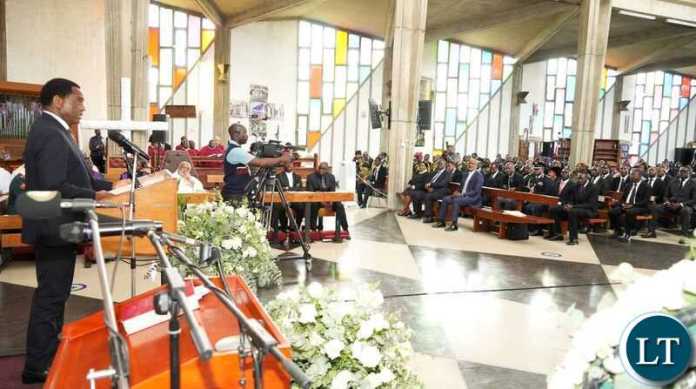By Benedict Tembo
FOR veteran broadcaster Annie Mukabe, scooping the inaugural ZANACO CEO’s award during the Zee Women’ s Banking Awards ceremony came as a breath of fresh air. It has also given her impetus to do her best.
The Zee Women’s Banking Awards given out last Friday, are intended to recognise women who have made a positive impact in their areas of expertise.
Zanaco chief executive officer Mukwandi Chibesakunda said as part of the bank’s continued support and appreciation for the female population, it launched the The Zee Women’s Banking Awards.
“It is a great feeling to be recognised in that manner and I will always be grateful to ZANACO CEO Mukwandi Chibesakunda and her team,” Mrs Mukabe said.
She says she would not be where she is today without the help of many broadcasters (both living and dead) who over the years shared their knowledge and experience unflinchingly.
It has been a great journey of her 34 years unbroken service with the Zambia National Brodacsting Corporation (ZNBC) and she thanks management for giving her the opportunity to serve in different capacities, as this has broadened her understanding of broadcasting and the role that each unit/ directorate plays in service delivery.
“My best years in the institution were the decade 1990- 2000 when I worked as a producer for the current affairs programmes Tonight and Focus. I enjoyed going in the field and interviewing people from different walks of life,” Mrs Mukabe says
She remembers going to a primary school in Kitwe’s Kwacha Township where Grade Seven pupils sitting for their final exams were made to share question papers.
“That was a scoop and we got the story on camera. The District Education Board Secretary then was Mrs Nsemiwe (late) who was not very happy with the ZNBC crew. The story was aired on Focus, and after that, there was a decree that all head teachers needed to get clearance from the DEB’s office before talking to the press,” Mrs Mukabe says
She also worked on the News desk for several years and in those days, to raise standards, the Director General then Steven Moyo introduced News Caster of the Month awards.
“The competition was stiff but I remember scooping these awards on several occasions. This was good in itself because we all wanted to be recognised for our effort and it was not strange to see those casting the news reporting early and going through their scripts over and over again, enquiring from the more experienced sub-editors how to pronounce difficult names/words,” Mrs Mukabe says.
She says it was a great experience casting news with the more experienced staff that included Peter Mweemba, Margaret Zimba, Harold Besa, Marc Boti, Doris Mulenga, Maureen Nkandu and Jospeh Kuluneta, among others.
And even when Mrs Mukabe started climbing the ladder getting promoted to HOPO / Controller TV, she continued producing programmes.
“Some of the productions I initiated include Poetry Corner on Radio 2, Fun Time (children’s programme) Let’s Cook (lifestyle), Going Green (environmental programme) visiting ordinary people’s gardens, both men and women sharing their passion on gardening. The rationale behind this was to foster an attitude change in the way Zambians look after the environment,” she says
Apart from this, Mrs Mukabe was involved in group productions she anchored Race to Manda Hill, Lunch Break and Good Morning Zambia. To this day, she is still passionate about programme production and discusses with colleagues on programme ideation as well as how best ZNBC can improve its in-house productions.
“Working in Corporate Affairs has enabled me to appreciate the manner in which the corporation engages with its stakeholders, explaining why we have to follow certain standards as we deliver on our mandate, and at the end of the day, ensuring that our clients as well as our listeners and viewers derive satisfaction from our services,” Mrs Mukabe says.
She is a mother of three (two boys and a girl), all working as computer scientists in the private sector.
“I am proud of who they have become, and I am no longer as strict as I used to be when they were younger, as they lead very independent lives now,” Mrs Mukabe says
She was born at Malcolm Watson Hospital in Mufulira. Her parents both worked in the Mufulira Division of Zambia Consolidated Copper Mines (ZCCM).
“My mum was a nurse while dad was personnel officer. I come from a family of 10 and I am the seventh born. We have lost five siblings,” Mrs Mukabe says
She did her primary school at Mufulira Trust and went on to Kantanshi Secondary School, after which her father was transferred to Nkana Division – and I changed schools and moved to Helen Kaunda Secondary School.
“Upon completion of my ‘O’ levels in 1986, I took a gap year traveling to Kabwe to visit my best friend Dorothy Nsai (late) and was a little involved in some youth projects. I did a Diploma course in Journalism at Africa Literature Centre in 1988, with a one-month internship at the Zambia National Broadcasting Corporation (ZNBC) in Lusaka and was one of the few lucky ones to have been offered a job before we even graduated, with my friend Chabala Chimpampa,” she says
Timeline:
- She was offered a job as a trainee Announcer/Presenter at ZNBC on December 18, 1988.
- 1990, she moved to Kitwe as a TV Producer
- Between 1995-2005, she served as Head of Production and Operations both In Kitwe and Lusaka
- Between 2009-2016, she served as Controller Television (Lusaka) and moved in the same capacity as Controller Programmes in Kitwe.
- 2018 she was promoted to Regional Controller based in Kitwe and in charge of the Northern region (North Western, Luapula, Northern, Muchinga and Copperbelt provinces)
- August 2020 she was transferred laterally to Lusaka to work as Head Corporate Affairs.
















